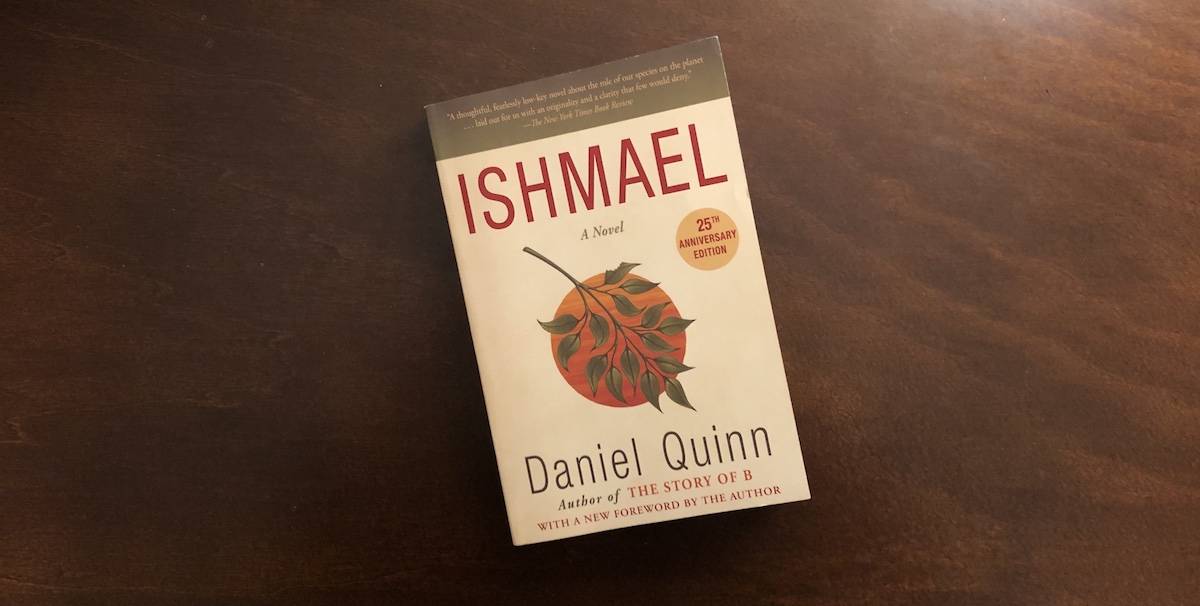Stories for Earth relies on contributions from our listeners and readers to produce high quality, in-depth content. If you buy something using the links on our website, we may earn a small commission, at no extra cost to you. For more information, see our Affiliate Disclosure.
Ishmael by Daniel Quinn is a story of nature making its case for stopping humanity’s destruction of Earth. Told as a Socratic dialogue between a talking gorilla named Ishmael and an anonymous narrator, Ishmael challenges the notion that humankind is somehow separate or above the rest of life on this planet, and it offers some ideas for building the framework of a sustainable society.
Never miss an episode
Subscribe wherever you enjoy podcasts:
Overview
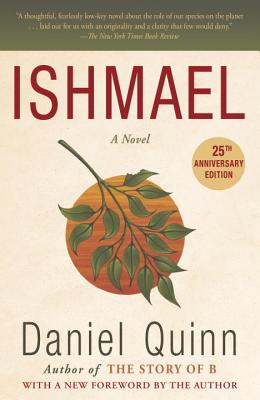
Ishmael by Daniel Quinn (buy on Bookshop from $16.56) is a work of philosophical ecofiction that was published in 1992. Written as a Socratic dialogue between a gorilla with the ability to speak telepathically, Ishmael, and an unnamed narrator, the book argues that the way modern humans live is unsustainable. To correct this, humans must re-examine their fundamental beliefs about their place in the world and work towards creating a future where all life can thrive. Before its publication, Ishmael won the Turner Tomorrow Fellowship as a work of fiction that offered excellent solutions to global problems. The book garnered praise from Ray Bradbury and has been taught in high schools and universities around the United States.
→ Buy USED on Better World Books from $3.98 (affiliate)
→ Buy NEW on Bookshop from $16.56 (affiliate)
→ Find at your local library
Jump to
About the creator
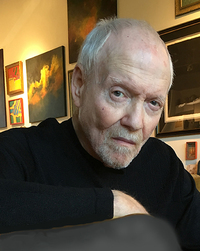
Daniel Quinn was an American freelance writer and author from Omaha, Nebraska. Before he became a writer, Quinn intended to be a Trappist monk, studying under the theologian Thomas Merton at the Abbey of Our Lady of Gethsemani in Bardstown, Kentucky. Following Merton’s advice, Quinn left the Abbey and gave up on his dream of becoming a monk. He found a job at a publishing company in Chicago, where he worked as an editor of several encyclopedias and educational books. Quinn went on to leave his career in publishing to become a freelance writer, writing several books including Ishmael, The Story of B, and Beyond Civilization. He died on February 17, 2018 in Houston, Texas at the age of 82 years old.
Transcript
I’m Forrest Brown, and you’re listening to Stories for Earth.
[music: “Cold Descent” by Forrest Brown]
Welcome to Stories for Earth, a climate change podcast about stories that can teach us lessons about emotional resilience in fighting the climate crisis. For a transcript of today’s show, a full list of sources, further recommended reading, articles, and more, visit our website at storiesforearth.com. If you’re listening on Apple Podcasts and you like what you hear, please consider leaving us a review. Reviews really help us reach more people.
Today we’ll be talking about a book called Ishmael by Daniel Quinn. If you haven’t read the book before, don’t worry about feeling lost. I’ll cover everything you need to know for you to get something meaningful out of our discussion. By the same token, many spoilers lie ahead. If you’re the kind of person who doesn’t like spoilers, I’d suggest listening to this episode after you’ve read the book.And now, here is our discussion of Ishmael. I hope you enjoy the show today.
How “Ishmael” came to be
Let’s be honest—talking about climate change can be depressing. The biggest news about climate change is never good. In fact, it keeps getting worse. Scientists are alarmed by how much faster the climate is changing than they thought it would, and we as a planet might be a few years away from reaching frightening tipping points that we only recently thought were decades away. This is truly terrifying stuff, and it seems to be all we hear about in the news and in circles where people talk about global warming.
No one wants to be around that person at the party who brings up such news, the person who drops morbid, startling statistics and then basically says, “We’re all screwed!” with a dark laugh. And yet, I have been this person more often than I would care to admit. Sure, climate change is scary. It’s frustrating and hopeless feeling to see the lack of serious action to do something about it, but it does no one any good to spread that feeling of despair and cynical resignation.
I later found out this kind of behavior is a symptom of climate grief, which is a natural response to learning about the dangers climate change poses to humanity. A British psychotherapist named Rosemary Randall talks about this particular brand of doomsday porn on an episode of the Ecosia podcast. She says it’s a natural part of processing the feelings of complex grief and the hopelessness that can accompany it. She says this stage doesn’t have to be permanent, and to move to a healthier state of mind, people should focus on what they can do to help.
I imagine this might have been what author Daniel Quinn was doing when he wrote his famous novel Ishmael. Quinn actually started writing Ishmael by writing another book first. It was called The Book of the Damned, a book Quinn described as “a book born in hell…a collection of damnable ideas, ideas to be cursed and denounced.”
He published it through his own independent press in serialized form, but when it came time to write the last part, he couldn’t summon the words the same way he had before. The whole book was a diatribe against humanity, excoriating humans for the damage they had wrought on the environment. But according to Quinn in the foreword to my copy of Ishmael, “…the rest of what I had to say simply could not be written in lightning strikes and thunder.”
What Daniel Quinn had to say next ended up being the book Ishmael. And while it was almost never published, it went on to receive Ted Turner’s Turner Tomorrow Fellowship, a prize awarded to a work of fiction that offered excellent solutions to global problems.I imagine that if The Book of the Damned was a product of Daniel Quinn’s state of righteous rage and cynical resignation, Ishmael was his response to “What can I do to help?” that pulled him out of despair, even if only for a short time. Today, it has a lot to teach us about how to reach other people so we can make a difference in fighting climate change.
“Ishmael” plot summary
Ishmael is a novel formatted as a Socratic dialogue between the narrator of the story and a telepathic gorilla named Ishmael. The story begins with the narrator, a man who is agonizing over how to save the world, when he just so happens to see an ad in the newspaper one day with a potential solution to his exact predicament. The ad reads, “Teacher seeks pupil. Must have an earnest desire to save the world. Apply in person.” Ecstatic, the narrator visits the address listed in the ad only to find himself alone in a small apartment with a massive gorilla in a cage.
The narrator soon discovers the gorilla can communicate telepathically, and he introduces himself as Ishmael, the author of the newspaper ad. Ishmael goes on to explain, through the Socratic method, what is wrong with the world today and how humans might begin to fix it. Humans, Ishmael explains, are like a person driving a car as fast as they can towards a cliff. If we don’t take our food off the accelerator and hit the brakes soon, we’re going to hurdle off that cliff to our certain death.
Who are the Takers and Leavers?
But not all of us are doing this. For simplicity’s sake, Ishmael tells the narrator there are two main groups of people living on Earth: the Takers and the Leavers. The Takers are the members of people in modern, developed countries who see the world as theirs for the taking. If you’re listening to this podcast, there’s a good chance you’re a Taker according to Ishmael’s lectures. Takers use words like “natural resources,” implying that the universe exists to serve them. Humankind rules the world, and we can do with it whatever we please.
Leavers, on the other hand, are the kinds of people the Takers used to be before they developed the psychotic notion that everything belongs to them. Leavers are people who live off the land. They might be hunter-gatherers living in tribes, but they don’t necessarily have to be. Before I read Ishmael, I read several summaries of the novel that essentially said Leavers all live in nomadic tribes in undeveloped countries. That is not the case.
While Leavers certainly could fall into this category, their defining trait is that they don’t believe the world belongs to them. Rather, they believe humans belong to the world—that is, they believe other species, every one of them from salmon to songbirds, have just as much of a claim to Earth as we do. According to Leavers, humans are no more fit to “rule” than any other animal. We all share the same home, and we should do our best to be good neighbors to the other life on our planet and to live sustainably.
But the world hasn’t always been this way. Ishmael says that a long time ago, we all used to be Leavers. There was a time when, for centuries, human beings lived sustainably. We took what the land provided, we lived in small communities, and we respected the Earth, even if we probably didn’t yet have modern notions like environmentalism or ecology. We simply lived as other animals do—we didn’t take any more than we needed, and we didn’t kill off other species for the sake of safeguarding a surplus of our own food supply.
A new take on the Garden of Eden story
But one day, that all changed. Ishmael takes the story of the Garden of Eden from Genesis in the Old Testament to illustrate how this change might have happened. According to Ishmael’s interpretation of this creation story, Adam and Eve were banished from the Garden not because they were disobedient, but because they became like gods, thinking they had the right to decide who gets to live and who gets to die—or, as the Bible originally put it, “knowing both good and evil.” After God banished Adam and Eve from the Garden of Eden, he told them that moving forward, they would work have to work for a living instead of living off the abundance of nature.
This, Ishmael says, is really the beginning of agriculture. It started when God banished Adam and Eve from the Garden, and it kicked into high gear after Cain, one of the first so-called “modern agriculturalists,” murdered his brother Abel. Abel was a shepherd, and Cain was a farmer. According to Ishmael’s reading of this Bible story, there was real significance behind this fact.
The dawn of human agriculture is when we as a species apparently started heading down the path to our own self-destruction. At first, this statement sounds ludicrous, even laughable. The discovery of agriculture might be the most significant event in human history.
Because we learned how to grow our own food, we no longer had to live as hunter-gatherers. We could put down roots—no pun intended—build villages that became towns that became cities that became empires. You could say that agriculture is the reason we have civilization and culture and technology today. Without it, the modern world would not be possible, and we’d still be living as, well, animals.
But Ishmael isn’t sold on this argument. Remember, he’s a gorilla, after all. I won’t go into all the details because I’d essentially be reading the book to you at that point, but Ishmael argues that life isn’t so bad for Leavers and all the other animals on Earth. In fact, he thinks everyone else has it pretty good. They may not have air conditioning or Beethoven or Tokyo, but they also don’t have to worry about driving themselves to the point of extinction. If it weren’t for Takers, in fact, life on Earth could probably continue unimpeded for millennia.
Ishmael doesn’t offer any concrete solutions to the problem of Takers living this way, but he does tell the narrator that more people need to know about the problem and that to survive, Takers must abandon their destructive mythology that places them at the center of the universe. Easy, right?
What is mythology?
Mythology plays a huge role in this book. In fact, Ishmael sees a certain mythology as the underlying sickness plaguing the Takers. The way Takers live is merely a symptom of this illness. According to Ishmael, Takers believe in a myth that says the world was created for humans and that creation ended with them.
But what is myth anyway? If you’re like the narrator of the book, your mind will probably go to stories of Greek and Norse mythology. I know mine did. We tend to think of myth as something only primitive societies used to explain things they didn’t have answers for. Today, we think we’re beyond needing myth. After all, we have science, and science can explain everything, right?
But this is not what Ishmael means when he talks about myth. Here is his definition: “A scenario interrelating man, the world, and the gods.”
We may not think we have something like this today, but we do. The funny thing about mythology is that no one knows they believe in it while they’re alive. Mythology is so embedded in the culture that you don’t think twice about it. Ishmael explains it like this: if you went back in time to Ancient Greece and asked any random person on the street about their mythology, they would probably give you a funny look. “We don’t have a mythology,” they would probably say.
To this you might respond, “But what about all those stories of Zeus and Athena and Aphrodite?”
The person from Ancient Greece would be taken aback. “What do you mean ‘stories?’” they would say. “Those aren’t just made-up fairytales, they’re the account of the way things came to be.”
Before Ishmael introduces this way of thinking about myth, he tells the narrator he’s interested in teaching a lesson about captivity. At first, we’re inclined to think Ishmael is talking about the captivity of animals, as in the way he lives in captivity as a circus gorilla, but it soon becomes clear that he’s getting at something a little more philosophical. As people with a mythology about the way the world came to be, we all live in captivity. Ishmael puts it like this:
“You’re captives of a civilizational system that more or less compels you to go on destroying the world in order to live.”
The narrator agrees, but he laments the fact that he doesn’t know how to escape this system. Ishmael explains that to escape, we first need to find the bars of our cage. The bars are a metaphor for our culture’s mythology, and to break them, we need to imagine a new mythology and enact it. Enacting a mythology means living in a way that will make it come true, and that’s the task we’re currently faced with.
How do we change our mythology?
This book can be so compelling at times that it almost tricks you into thinking it holds all the answers. Unfortunately, it does not, but it does leave us with the tools we’ll need to forge our next steps. At this point, I think it’s helpful to do a quick recap on everything Ishmael teaches the narrator:
- Human beings are not the problem. The problem is the belief that, “The world belongs to Man,” when in fact, “Man belongs to the world.”
- To ditch the belief that the world belongs to us, we need to imagine a different mythology and live to make it come true.
I think people are finally beginning to wake up to this idea, even if they’ve never heard of the book Ishmael before. Around the world, scientists, activists, school children, and everyday people are calling for humans to stop destroying the planet and to adopt a sustainable way of living. We now have a Zero-Waste Movement. Countries are beginning to declare climate emergencies. As a global trend, renewable energy is set to become more affordable than fossil fuels.
There are many reasons to be hopeful in the face of climate change, even if at times it seems like an impossible challenge. But turning towards living sustainably is still very much not the status quo.
The culture is changing, yes, but it’s not changing fast enough. In fact, many people see this cultural shift as a threat to their way of living. Some people—a few prominent Republican politicians come to mind—say that proponents of a Green New Deal want to make hamburgers and airplanes illegal. This is obviously untrue to the point of being absurd, but some people really think this.
Change is never easy or void of controversy, and that’s certainly true about the push for building a sustainable world.
We need more than a “vision of doom”
Ishmael makes an observation towards the end of the book that I think might be the most powerful and relevant one to us today. He says, “…people need more than to be scolded, more than to be made to feel stupid and guilty. They need more than a vision of doom. They need a vision of the world and of themselves that inspires them.”
This statement was very ahead of its time. Today we have an emerging field of study devoted to figuring out the best ways to communicate the risks of climate change so that human behavior changes for the better. Many universities around the world now offer courses on climate change communication, including Yale and George Mason University. In fact, climate change is now a central part of public health communication.
And what does the research show? Time and again, people are best motivated to make positive behavior changes when they are first warned about the dangers of climate change and then presented with a positive vision of what the future could look like if we take appropriate actions. This second part is crucial. Without it, people tend to shut down. They feel hopeless and lost. Sometimes, they react the way people do when they’re grieving—denying that something terrible has happened or is happening and pretending they can go on living the same way they always have.
What we have now is a vision of doom. And while this is a necessary first step to waking up the world to fight climate change, it’s only half the battle. What we need to start working on now is writing the mythology of the future. This is a future where humans can exist alongside all the other forms of life on Earth without killing them. It’s a future where we learn to make civilization work so that it contributes to the flourishing of all life. It’s a future that we don’t have a very clear vision of yet, but we can change that.
Creating a canon for the mythology of the future
I hadn’t heard of Ishmael when I started this podcast. A co-worker gave it to me as a birthday present. But after reading the book and thinking about all that it says about Taker mythology and the need to change that mythology, I realized that this gets at the heart of what I want to do with this podcast.
It would be foolish to think that one book or movie could change the Taker mythology that we all subscribe to. But I do think that, taken together with other like minded cultural narratives, we can begin to curate a sort of canon for the mythology of the future. This canon won’t be bound by genre or medium. The only requirements for works to be added to it is that they adequately warn us about the catastrophe we’re headed towards and provide us with an alternate vision of a better future.
This might sound very pie-in-the-sky, but I think if we’re going to have any chance of averting a climate apocalypse, we’ll need a canon like this, among other devices, to inspire us to be better. Ishmael opens our eyes to why this is so necessary, and it leaves us with a powerful commission that may sound slightly familiar: go out and tell as many people as you can, warning them about their current path towards destruction and inspiring them to live up to their full potential for saving the world.
[music: “Cold Descent” by Forrest Brown]
That’s it for our discussion of Ishmael by Daniel Quinn. Be sure to subscribe to our podcast to get notified every time we release a new episode, and leave us a nice review on Apple Podcasts if you feel so inclined.
Visit us online at storiesforearth.com for transcripts of every episode and additional content, and consider making a recurring monthly donation to support our show through Patreon. You can find us at patreon.com/storiesforearth. That’s patreon.com/storiesforearth. Until next time, I’m Forrest Brown. Thanks for listening.
Recommendations

Book: The Unsettling of America by Wendell Berry
→ Buy on Better World Books (affiliate)
→ Buy NEW on Bookshop from $15.59 (affiliate)
→ Find at your local library
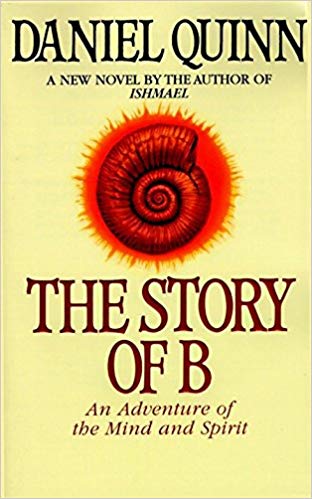
Book: The Story of B by Daniel Quinn
→ Buy USED on Better World Books from $4.50 (affiliate)
→ Buy NEW on Bookshop from $16.56 (affiliate)
→ Find at your local library
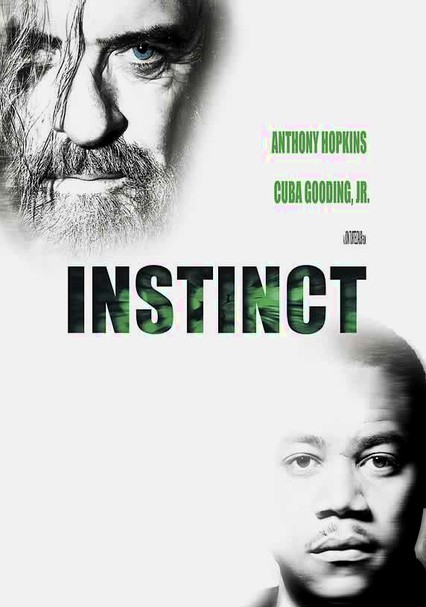
Movie: Instinct
Director: Jon Turteltaub
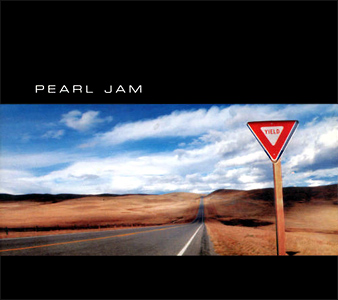
Album: Yield
Artist: Pearl Jam
